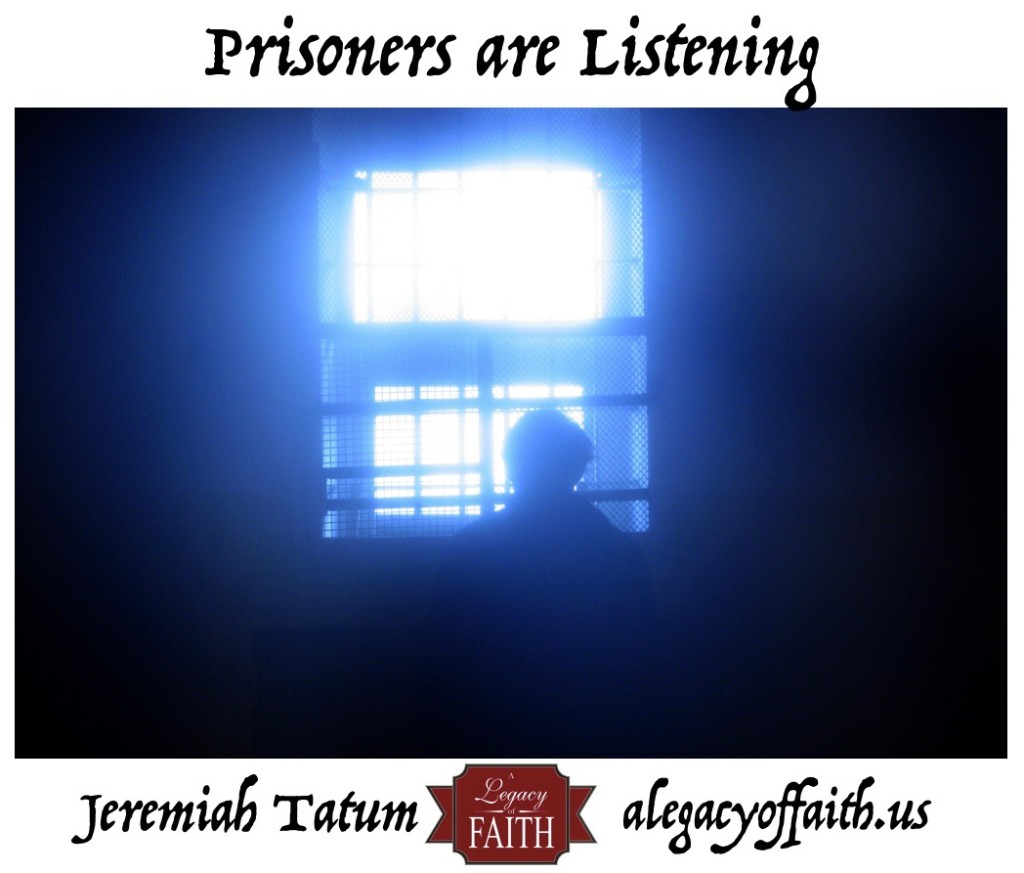Prisoners are Listening

When Paul and Silas were arrested and unmercifully beaten with rods for preaching the gospel, they were found doing something that was by no means typical. Having their hands and feet fastened in stocks in the inner prison of Philippi, and still suffering from the terrible torture they had received, the Bible says, “But at midnight Paul and Silas were praying and singing hymns to God” (Acts 16:25).
Have you ever wondered about the content of their prayers? Were they prayers of thanksgiving that they were counted worthy to suffer for the name of Jesus (Acts 5:41)? Were they prayers for boldness to continue to preach the word of God in spite of persecution (Acts 4:29)? Were the prayers that those who were in prison with them, including all the workers in the jail, might hear the gospel and receive it during their stay (Phil. 1:12-13)? Were they prayers for deliverance from imprisonment (Acts 12:5)?
They Were Singing, but Others were Listening
Have you ever wondered what they must have been singing? Were they songs of praise, or joy, or suffering, or freedom, or help? Whatever they were praying and singing, it made an impact. A great earthquake rocked the jail and opened all the cells. The jailer and his family were converted to Christianity the same day, and Paul and Silas walked away free men. But one other statement in this passage also seems to be very significant. At the end of verse 25 the text includes this addition to the songs and prayers of these missionaries: “…and the prisoners were listening to them.”
The prisoners were listening. They may have had no choice to listen and were, therefore, a “captive audience.” They may have been listening because they were amazed that Paul and Silas could have such an incredible attitude concerning the severity of the beatings and their incarceration. They may have been listening because they were not used to hearing prayers and songs – perhaps none of them customarily practiced such things. But in any event, they were listening. It makes one wonder what the eventual results may have been for some of the fellow prisoners of Silas and Paul.
This Detail is for Us
Why would the Holy Spirit include this tidbit of information in the historical account of the Acts of the Apostles? There is no follow-up information that leads the reader to believe that anything further ever developed in the hearts and minds of these prisoners of Philippi. It occurs to me that maybe this statement was written for us.
You see, we live in a world full of prisoners. Multitudes of people are imprisoned by sin that will eventually lead to the loss of their eternal souls. They walk and talk on earth but are shackled by its temporary limitations. They have been taken captive by the devil as live prisoners to do his will, and they need to hear the gospel and obey it to escape Satan’s deceptive snare (2 Tim. 2:25-26).
We just happen to be in the presence of spiritual prisoners every day. We may not consider that they watch and listen, but they most certainly do. When we go into the workplace with our fellow employees, prisoners are listening. When we go to school and sit down at our desks with fellow classmates, prisoners are listening. When we are in the stands at a ballgame, when we are at the store, when we are anywhere in public, prisoners are listening.
I wonder if they hear our prayers? I wonder if they feel our songs? I wonder if they know that though we are temporarily bound with them in the flesh and in this present world, that within we have been set free?
“I was naked and you clothed Me; I was sick and you visited Me; I was in prison and you came to Me.”
– Matthew 25:36
————————
To Receive Every Post via Email for Free, Click Here



